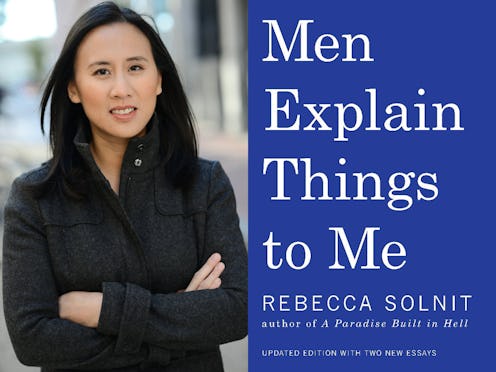
In the months since Donald Trump has become president, more and more people have become inspired to join the Resistance — whether that means volunteering, campaigning, donating, making calls, educating themselves and others on the issues, or otherwise. Bustle's 31 Days of Reading Resistance takes a look at the role of literature and writing in the Resistance, both as a source of inspiration and as a tool for action.
Celeste Ng specializes in complicated families and the nuances of womanhood, especially that liminal space between child and adult. Her debut novel, Everything I Never Told You, which centers around a Chinese-American family living in small-town Ohio, was a New York Times Bestseller, a New York Times Book Review Editor's Choice and winner of the Alex Award, awarded by the Young Adult Library Services Association and the APALA Award for Fiction.
Ng's latest novel, Little Fires Everywhere, charts the dissolution of a seemingly idyllic family living in Shaker Heights, a real-life suburb of Cleveland. When artist Mia Warren arrives seemingly out of the ether with her teenage daughter, Pearl, Elena Richardson happily rents out her family's second apartment to the pair. But Mia's lifestyle makes waves, in a community that has a veneration of order and organization written into its bylaws. And those waves get bigger when both Elena and Mia are drawn into a custody battle between a single mother, her Chinese-American baby, and a white family desperate to adopt a child.
In Little Fires Everywhere, Ng holds a mirror up to the self-proclaimed liberal outposts that exist throughout American suburbia, who are support equality so long as it doesn't disrupt their own communities. But she treats even the most frustrating characters with sensitivity. She reminds us we could each stand some self-reflection.
Little Fires Everywhere by Celeste Ng, $19, Amazon
I read Little Fires Everywhere over the course of a tearful 48 hours, and suggest you do the same. And once you've torn through Ng's novel, check out her recommendations for fostering resistance.
Celeste Ng says: "I encountered the title essay first, and it resonated so deeply with me I actually had to sit down. I’m not sure if it’s because I’m a woman, or because I’m Asian, or because I’m small—likely a combination of all three—but like most women, men do indeed explain things to me. I’ve had writing explained to me at writing festivals where I was a featured writer. At a cocktail party, a white man tried to explain the “Asian flush” to me, then went on to explain Hong Kong, where my family comes from and where, he admitted, he hadn’t spent much time. I’m grateful to Rebecca Solnit for elegantly articulating this rage—and the rage I and many other women feel daily when faced with what the world assumes about us and allows us. Reading this book channels that fury into a laser beam that I want to wield like a light saber."
Celeste Ng says: "This is a marvel of a book, but the page that guts me is page 134. In the original edition, I’m told, it listed only one name, Jordan Russell Davis. However, in my edition—the fifth printing, because Citizen was in such demand I couldn’t find it in a store for weeks—it lists four: Jordan Russell Davis, Eric Garner, John Crawford, Michael Brown. With every reprinting, the list is updated, a longer list of black people killed by police. I checked in the bookstore today; the seventeenth edition has twenty-two, and is running out of lines. Citizen is much more than this list of names, of course; word for word, it might be the single most potent book on racism, and anti-blackness, in our time. But that page serves as an evolving record, and memorial, of the lives lost. We need to remember, and do better, and keep fighting."
Celeste Ng says: "Yeah, this is a children’s book. Yeah, I know Harry Potter is over-referenced. Hear me out. I was 23 when Book 5 came out. I was holding my first 'real' job and paying my own bills. I had just gotten engaged. A few months later, my father would die unexpectedly. In other words, when I read this book, I was just entering the adult world for the first time, in every possible way. The Order of the Phoenix, at this particular moment, reminded me of the fire I’d felt as a teenager: that yes, there was unfairness in the world, but that even someone young and inexperienced and afraid could withstand it, and even fight it. Of all the Harry Potter books, this is my favorite: it’s a tipping point, where the young heroes are asked, finally, to choose a side. That moment comes for all of us at one age or another, and that hell no feeling when you decide to take action in the face of injustice gets me every time."
Celeste Ng says: "Every day, this book feels less and less like a dystopia. There’s a reason it’s atop the bestseller lists again, even though it’s over three decades old; there’s a reason the new TV adaptation has been such a hit. Margaret Atwood speaks to some of the problems we’re facing today: the power men still have over women, the power those who make the rules have over the rest. It’s just as relevant today—maybe more so—as it was in 1985. Nolite te bastardes carborundum. In other words: resist."
Follow along all month long for more Reading Resistance book recommendations.